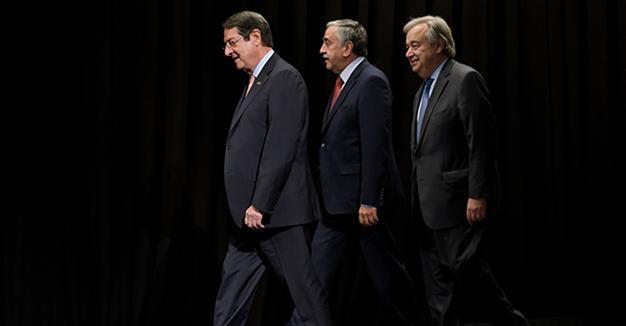Ankara blames Greek Cypriot side for failure in Cyprus peace talks
ANKARA, CRANS-MONTANA, Switzerland

Talks to reunify the divided island of Cyprus collapsed in the early hours of July 7, with Ankara accusing the Greek side for the failure in the process widely seen as the most promising in generations to heal decades of problem.
“Unfortunately, the Greek Cypriot side did not take an expected constructive stance for a solution, given that it feels comfortable for being an European Union member,” Turkish Prime Minister Binali Yıldırım said in Ankara on July 7, after the collapse was announced.
He said the Turkish Cypriot side tried to remain constructive all from the beginning, accusing the 2004 move to accept Greek Cyprus as a full member of the EU of laying the foundation for the negative outcome at the talks.
Turkey will do everything within the framework of international law to defend the rights of Turkish Cypriots, Yıldırım added.
“The Turkish Cypriot side has fulfilled all its duties at the bargaining table for a permanent and fair solution,” Turkish Foreign Minister Mevlüt Çavuşoğlu added.
“This outcome shows the impossibility of reaching a settlement within the parameters of the United Nation’s goodwill mission,” he said.
He said the prime ministers of the grantor nations – Turkey, Greece and the United Kingdom - would have been invited to the discussions in the Swiss Alps if there was a positive atmosphere.
Çavuşoğlu stressed that Turkey now has to assess and decide its next steps to resolve the Cyprus issue.
Turkish Cypriot President Mustafa Akıncı also criticized the Greek Cypriot side for the failure. “This chance we lost might hardly ever come again,” he said.
“Unfortunately, we couldn’t manage to complete the last trial of our generation to reunify the island successfully,” Akıncı told reporters.
“At a point where both sides have lost, unfortunately, the talks failed,” he said.
Akıncı said while the Turkish side was willing to take steps toward reducing the number of troops on the island, from the first day of the talks the Greek Cypriot side began with a “zero-troops” position.
But the talks’ collapse was not only about the presence of Turkish soldiers on the island, he said.
“This is not the end of the world. We will find a way to live with honor. We will manage this,” he added.
Speaking about the idea of a rotating presidency, Akıncı said the Greek Cypriot side was against the idea but signaled it could accept it if the Turkish Cypriot side accepted having “zero troops” on the island.
“I’m very sorry to tell you that despite the very strong commitment and engagement of all the delegations and different parties, the conference on Cyprus was closed without an agreement being reached,” United Nations Secretary-General Antonio Guterres told a news conference after a stormy last session.
The collapse marked an end to more than two years of a process that had been widely thought of as the “best chance” at reunification since the island was split between its Greek and Turkish Cypriot populations in 1974.
Guterres had flown in on July 6 to press Akıncı and Greek Cypriot leader Nicos Anastasiades to seal a deal reuniting the east Mediterranean island, while U.S. Vice President Mike Pence had phoned to urge them to “seize this historic opportunity.”
The week of talks in the Swiss Alps, which the United Nations said was the “the best chance” for a deal, ground to a halt as the two sides failed to overcome final obstacles.
“Unfortunately, an agreement was not possible, and the conference was closed without the possibility to bring a solution to this dramatic and long-lasting problem,” Guterres said.
“That doesn’t mean that other initiatives cannot be developed in order to address the Cyprus problem,” he added.
Guterres declined to elaborate on what exactly had caused the collapse, but said there was still a wide gap between the two delegations on a number of questions.
Reunification attempts have always been under the umbrella of the United Nations, which has one of its longest-serving peacekeeping forces on the island.
Greek Cypriots, due to launch gas drilling off the island in coming weeks that Turkey opposes, pointed the finger of blame at the Turkish side.
Nicos Christodoulides, spokesman for the Greek Cypriot government, said Turkey had refused to relinquish its intervention rights on Cyprus or the presence of troops on the island.
“Tonight’s development is in no way positive, but it is not the end of the road either,” he said, without elaborating.
“This is a disappointing outcome. The U.K. continues to be a strong supporter of a settlement. Now is a time for calm reflection and consideration of future steps. The commitment of the U.K. to a deal on Cyprus remains unwavering,” British Minister of State for Europe and the Americas Alan Duncan said after the conferenc
 Talks to reunify the divided island of Cyprus collapsed in the early hours of July 7, with Ankara accusing the Greek side for the failure in the process widely seen as the most promising in generations to heal decades of problem.
Talks to reunify the divided island of Cyprus collapsed in the early hours of July 7, with Ankara accusing the Greek side for the failure in the process widely seen as the most promising in generations to heal decades of problem.